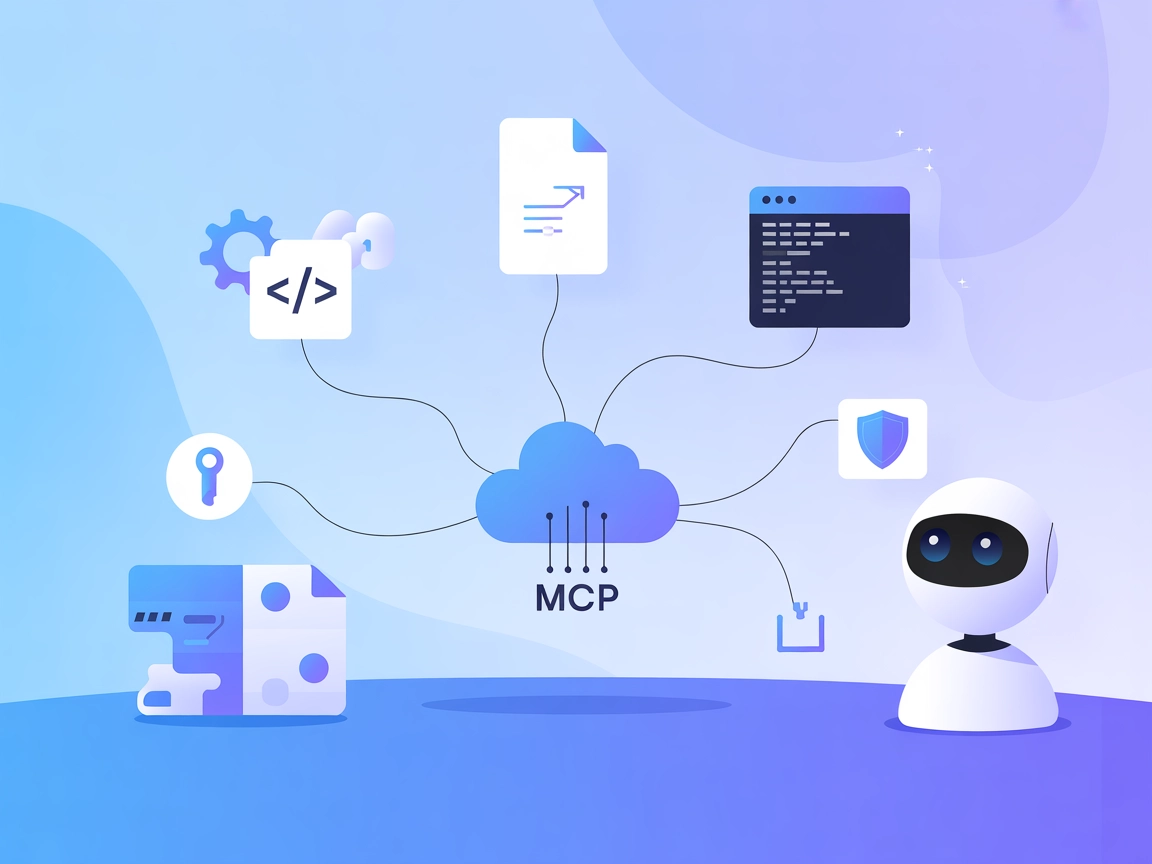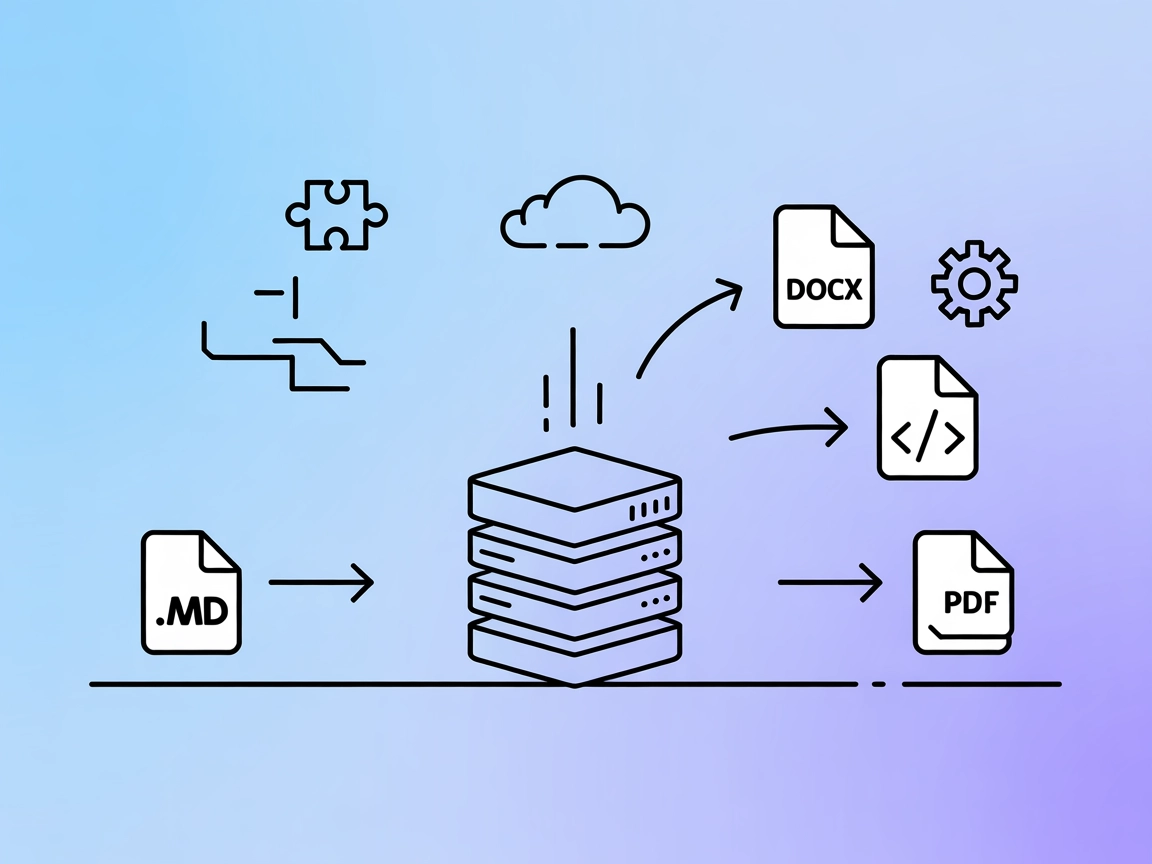
Markitdown MCP Server
The Markitdown MCP Server bridges AI assistants with markdown content, enabling automated documentation, content analysis, and markdown file management for enha...

Convert files, web pages, audio, and more into Markdown for AI-ready, unified content access with Markdownify MCP Server.
FlowHunt provides an additional security layer between your internal systems and AI tools, giving you granular control over which tools are accessible from your MCP servers. MCP servers hosted in our infrastructure can be seamlessly integrated with FlowHunt's chatbot as well as popular AI platforms like ChatGPT, Claude, and various AI editors.
Markdownify MCP Server is a Model Context Protocol (MCP) server designed to convert various file types and web content into Markdown format. It acts as a bridge between AI assistants and external data sources, streamlining the process of transforming documents, images, audio, and web pages into easily readable and shareable Markdown text. By exposing a suite of tools, Markdownify enables tasks such as extracting text from PDFs, retrieving YouTube video transcripts, or converting audio files through transcription. This enhances development workflows by providing standardized, machine-readable content from otherwise complex or unstructured sources, making it easier for AI-powered applications to use, summarize, and process rich information.
(No prompt templates are explicitly mentioned in the repository or documentation.)
(No explicit MCP resources are detailed in the repository or documentation.)
.md or .markdown extensions) from a specified directory.pnpm are installed.git clone https://github.com/zcaceres/markdownify-mcp.git
cd markdownify-mcp
pnpm install
pnpm run build
{
"mcpServers": {
"markdownify": {
"command": "node",
"args": [
"/absolute/path/to/markdownify-mcp/dist/index.js"
],
"env": {
"UV_PATH": "/path/to/uv"
}
}
}
}
Securing API Keys Example:
{
"env": {
"API_KEY": "${API_KEY}"
},
"inputs": {
"api_key": "${API_KEY}"
}
}
pnpm.{
"mcpServers": {
"markdownify": {
"command": "node",
"args": [
"/absolute/path/to/markdownify-mcp/dist/index.js"
],
"env": {
"UV_PATH": "/path/to/uv"
}
}
}
}
pnpm.pnpm run build.mcpServers section:{
"mcpServers": {
"markdownify": {
"command": "node",
"args": [
"/absolute/path/to/markdownify-mcp/dist/index.js"
],
"env": {
"UV_PATH": "/path/to/uv"
}
}
}
}
pnpm, then clone and install as above.mcpServers config:{
"mcpServers": {
"markdownify": {
"command": "node",
"args": [
"/absolute/path/to/markdownify-mcp/dist/index.js"
],
"env": {
"UV_PATH": "/path/to/uv"
}
}
}
}
Note: Use environment variables to securely manage API keys (see example above).
Using MCP in FlowHunt
To integrate MCP servers into your FlowHunt workflow, start by adding the MCP component to your flow and connecting it to your AI agent:

Click on the MCP component to open the configuration panel. In the system MCP configuration section, insert your MCP server details using this JSON format:
{
"markdownify": {
"transport": "streamable_http",
"url": "https://yourmcpserver.example/pathtothemcp/url"
}
}
Once configured, the AI agent is now able to use this MCP as a tool with access to all its functions and capabilities. Remember to change “markdownify” to the actual name of your MCP server and replace the URL with your own MCP server URL.
| Section | Availability | Details/Notes |
|---|---|---|
| Overview | ✅ | Clear description in README. |
| List of Prompts | ⛔ | No prompt templates mentioned. |
| List of Resources | ⛔ | No explicit resources detailed. |
| List of Tools | ✅ | 10 tools listed in README. |
| Securing API Keys | ✅ | Example shown in configuration section. |
| Sampling Support (less important in evaluation) | ⛔ | Not mentioned. |
Based on the above tables, Markdownify MCP Server is focused on practical conversion tools and setup guidance, but lacks detail on prompt templates, resources, and advanced MCP features like sampling and roots. The documentation is clear for tools and setup, but information on deeper MCP primitives is missing.
Markdownify MCP Server is robust for document and content conversion use cases, with a wide range of supported file types and good setup documentation. However, the absence of explicit prompt templates, MCP resources, and clarity around advanced features like sampling and roots limits its score for more advanced MCP integrations. For direct practical use in file-to-Markdown conversion, it scores high; for deep protocol extensibility, less so.
| Has a LICENSE | ✅ (MIT) |
|---|---|
| Has at least one tool | ✅ |
| Number of Forks | 140 |
| Number of Stars | 1.8k |
Markdownify MCP Server is a Model Context Protocol (MCP) server that converts a wide range of file types—such as PDFs, DOCX, PPTX, XLSX, images, audio, and web pages—into clean, standardized Markdown. This enables AI assistants and other workflows to easily process, summarize, and utilize complex external content in a consistent format.
Markdownify supports converting YouTube videos, PDFs, Bing search results, general web pages, images (with metadata), audio files (with transcription), Microsoft Word (DOCX), Excel (XLSX), PowerPoint (PPTX), and can also retrieve existing Markdown files.
Primary use cases include document conversion for knowledge management, summarizing web content, transcribing audio, converting images with metadata, retrieving Markdown files for collaboration, and enabling AI agents to access and process real-world content in a standardized Markdown format.
Clone the repository, install dependencies with pnpm, and build the project. Then add the server to your FlowHunt or other MCP-compatible environment's configuration, specifying the path to the built index.js and any needed environment variables. See the detailed setup instructions per platform above.
You can secure API keys and sensitive data using environment variables in your configuration, as shown in the setup examples. Always ensure your server environment follows best practices for security and access control.
Unlock seamless content conversion and AI integration by deploying Markdownify MCP Server in your FlowHunt workflows.

The Markitdown MCP Server bridges AI assistants with markdown content, enabling automated documentation, content analysis, and markdown file management for enha...

The Pandoc MCP Server enables seamless, automated document format conversion using the powerful pandoc tool. Integrate it with FlowHunt or other AI systems to t...

The Pandoc MCP Server bridges AI assistants and document conversion by exposing Pandoc’s universal converter through the Model Context Protocol (MCP). Automate ...
Cookie Consent
We use cookies to enhance your browsing experience and analyze our traffic. See our privacy policy.